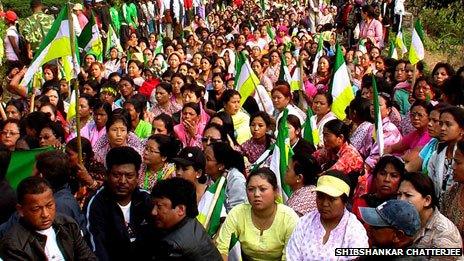Gorkha strike disrupts life in India's Darjeeling hills
- Published

The campaign has affected tea and tourism, mainstays of the Darjeeling economy
A 72-hour strike called by the main Gorkha ethnic group in India's West Bengal state has brought life to a standstill in the tea-producing Darjeeling hills.
The protest by the Gorkha Janamukti Morcha party is demanding a separate state for Nepali-speaking Gorkhas.
A large number of paramilitary troops and police have been deployed to maintain peace in the hill region.
Tourism and tea production will be worst hit by the strike, locals say.
The strike began at 06:00 India time (00:30GMT) on Monday and reports say there is little traffic on the highway that connects Darjeeling with the town of Siliguri in the plains of north Bengal.
About a dozen supporters of the Gorkha Janamukti Morcha (GJM) were held after they set a motorcycle and a car on fire in the Rambi area, the Press Trust of India news agency said.
Supporters also blocked roads in the region.
Darjeeling town was largely deserted with tourists staying away from the hills.
Reports said 1,000 GJM supporters were protesting at Chowkbazar with party flags, while large gatherings were also reported from Jorbungalow, Mirik and Sukhiapokhri.
Roads were also barricaded by the GJM in Kalimpong and Kurseong towns.
The GJM has written to PM Manmohan Singh urging him to accept their demand for a separate state they want named Gorkhaland.
'Old demand'
"Our demand for Gorkhaland is an old one and generations of our people have fought for it. Now we want it because we see no future for us in West Bengal," said GJM general secretary Roshan Giri.
Mr Giri said as the Congress-led government in Delhi was "considering" creating a new state of Telangana, external to be carved out of the southern state of Andhra Pradesh, "it was about time they concede Gorkhaland".
"Our demand for a separate state is as old, as justified and meaningful as that of a separate Telangana," he added.
In June 2011, the GJM signed a deal with the Indian government and the government of West Bengal state for greater autonomy.
The deal paved the way for the setting up of a Gorkhaland Territorial Administration (GTA), an elected body for the Darjeeling hills.
It is not clear whether the GJM will now relinquish its responsibility of running the GTA.
West Bengal Chief Minister Mamata Banerji has said she is upset with the revived agitation and warned that it will be "tackled in a tough way if it turned violent".
The Gorkha campaign for a separate state started in the early 1980s.
But a settlement that gave them considerable autonomy brought the movement to an end in 1988.
However, five years ago, the movement was resumed by Gorkha hardliners who say the autonomy arrangement has not worked.